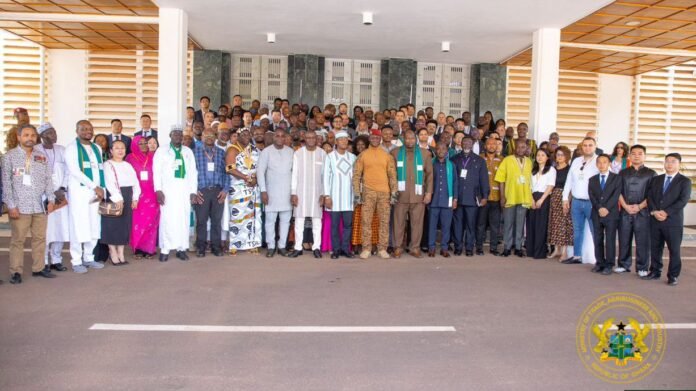Ghana’s Deputy Minister for Trade, Agribusiness, and Industry, Hon. Sampson Ahi, has called for the strengthening of economic ties between Ghana and Burkina Faso.
Hon. Ahi made the call at a bilateral meeting with the Burkina Faso Minister for Industry, Trade and Craft, Donatien Nagalo, in Ouagadougou on Friday October 10, 2025.
The meeting, centered on the theme: “Structural Investments for a Sovereign Burkina Faso,” served as a platform for deepening economic ties across West Africa, particularly in trade, industry, and agriculture.
In his speech, the Deputy Minister emphasized the shared economic and cultural ties between Ghana and Burkina Faso, underscoring the importance of further strengthening their cooperation to drive mutual prosperity.
He highlighted that Ghana and Burkina Faso not only share a border but also a deep history of friendship, cultural exchange, and a common vision for a prosperous and united West Africa.
As the region faces challenges in fostering job creation, competitiveness, and resilience, the Deputy Minister stressed that responsible investment and seamless movement of goods are crucial. He noted that forums like the “Invest in Burkina Faso” are vital for connecting business opportunities with capital, technology, and skills, transforming ideas into tangible projects that benefit both countries.
Growing Trade Between Ghana and Burkina Faso
Trade between the two nations has been growing steadily, with total bilateral trade in 2024 reaching approximately US$300 million. Ghana exports processed foods, pharmaceuticals, construction materials, and cocoa derivatives, while it imports cotton, textiles, livestock, and agricultural products such as shea butter and sesame seeds from Burkina Faso. These exchanges illustrate the complementary nature of their economies and reveal significant opportunities for further collaboration, particularly in value-added agricultural and industrial sectors.
The Deputy Minister highlighted various flagship initiatives in Ghana designed to foster business growth and attract investment. Key among these is the Feed the Industry Programme, which ensures a reliable supply of raw materials for agro-processing, and the Agribusiness Development and Value Extension Programme, which focuses on adding value to agricultural products and building competitive value chains. These initiatives, along with programs like MAKE24 and BUILD24, aim to enhance industrial productivity and infrastructure, making Ghana an increasingly attractive destination for investment.
Exploring Opportunities for Joint Ventures
Ghana’s numerous investment-friendly policies, including the Textiles and Garments Policy, Pharmaceutical Manufacturing Policy, and Automotive Component Manufacturing Policy, offer incentives to investors. Hon. Ahi urged that these policies, combined with Ghana’s continuous push to develop infrastructure such as industrial parks and logistics facilities, create the perfect environment for Burkina Faso to further integrate into regional value chains. For instance, Burkina Faso’s robust cotton production could feed Ghana’s textile mills, while its tomato and vegetable crops could supply raw materials for Ghana’s food processing industry.
Additionally, both nations are exploring opportunities to improve cross-border transport and logistics.
He called for improvements to critical trade routes, particularly the road linking the Port of Tema in Ghana to Ouagadougou, alongside initiatives to upgrade dry ports and warehousing facilities. Such improvements would reduce delays and costs for traders and industries on both sides, fostering smoother trade flows between the two countries and beyond. Energy integration also holds potential for collaboration, with both countries exploring the development of renewable energy sources and power interconnections that could support industrial growth in the region.
Practical Steps for Collaboration
To transform these opportunities into concrete results, the Deputy Minister proposed several actionable steps. He suggested identifying joint pilot projects in key sectors such as cotton, tomatoes, logistics, and energy within the next six months. Furthermore, he called for the establishment of a joint Investment Facilitation Desk to streamline the approval process for investors and ensure long-term support.
Another important initiative was the strengthening of quality standards and infrastructure to ensure that products from both countries meet the demands of regional and global markets, particularly under the African Continental Free Trade Area (AfCFTA).
A Call to Action for a Resilient West African Market
In closing, the Deputy Minister emphasized that the people of both Ghana and Burkina Faso are counting on tangible outcomes from forums such as “Invest in Burkina Faso” international forum. He urged all stakeholders to move beyond discussions and work towards creating jobs, strengthening industries, and fostering a resilient and competitive regional market.
He reaffirmed Ghana’s commitment to building a future of shared prosperity with Burkina Faso, built on the pillars of trade, investment, and industrialization, and encouraged all participants to seize the opportunity to turn today’s conversations into tomorrow’s lasting partnerships.
Organized under the auspices of the Ministry of Industry, Trade and Craft of Burkina Faso and graced by the country’s Head of State Capt. Ibrahim Toure, the forum brought together government leaders, investors, and private sector representatives to explore opportunities for deepening trade and economic cooperation across the sub-region.
Ghana’s participation in FIIBF underscores the government’s commitment to fostering partnerships that attract investment, create jobs, and expand opportunities for Ghanaian businesses within the West African market and beyond.








